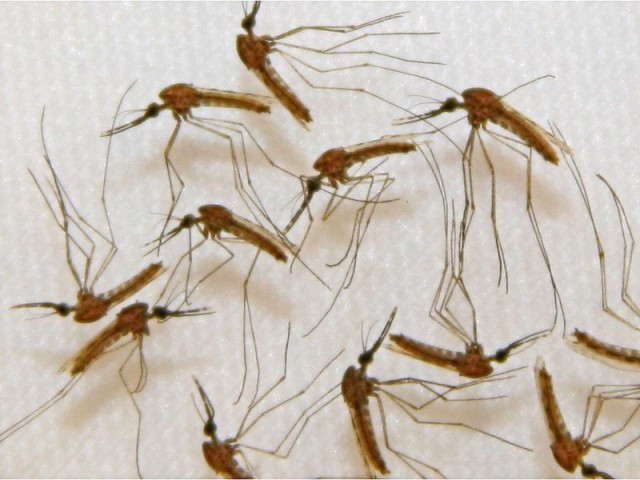Graveyards a hotbed of dengue mosquitoes: DCO
Health EDO says number of cases likely to go down in a week

Health EDO says number of cases likely to go down in a week . PHOTO: AFP
Graveyards in the city are among the high-risk spots for dengue mosquitoes, DCO Zahid Saleem Gondal said on Sunday while chairing a meeting of the district administration with regard to the anti-dengue campaign. Additional District Collector Manzar Javaid was also present at the meeting.
Gondal said officials had found dengue larvae in 122 graveyards where there were deep pits filled with stagnant water. Gondal said teams of Town Administration, Parks and Horticultural Authority and the Solid Waste Management Company had been tasked with filling these with earth to prevent dengue mosquito breeding and growth of dengue larvae in rainy season. Officials were told to seal commercial properties where dengue larvae were found. He also told them to register cases and arrest the owners of houses where the larvae were found.
The DCO directed the authorities to take strict action against people who tried to prevent officials from doing their work and advised the authorities to cooperate with various departments to ensure complete eradication of dengue mosquitoes.

Gondal said the monitoring staff had been given android mobile phones to upload pictorial data on a dash board every day. He ordered department heads to suspend those field workers who were negligent in surveillance duties, especially in the red union councils. He said that officials of the Health Department were also being monitored by the Special Branch.
Information counters have been set up at public and private hospitals to distribute awareness pamphlets and brochures among patients and attendants visiting the hospitals. Under directives from the DCO, all private hospitals have been told to refer patients suffering from dengue fever to Nishtar Hospital after initial diagnosis. Their blood samples will be sent to Lahore for testing from Nishtar Hospital.
The DCO said that the district government had requested the provincial government to set up a laboratory like the one in Lahore for diagnosis of dengue fever patients so that blood test reports could be processed quickly. He said the district government had destroyed 2,000 tires in three days.
Health EDO Iftikhar Qureshi, however, told APP that they were hopeful that the number of dengue fever cases in Multan would decline within a week’s time.
He said 20 union councils in Multan were on high alert for dengue fever cases. The Health Department has assigned six teams to monitor the anti-dengue campaign in each union council. The health EDO said three or four cases of dengue fever were being reported from various areas of Multan every day.
Qureshi said, however, the government has been working hard in taking steps to tackle the situation. He said 78 out of 210 suspected dengue fever patients had tested positive for the virus since January this year. Of the confirmed cases, 74 were from Multan district, two were from Muzaffargarh, and one from Karachi and Khanewal each, he said.
The health EDO said there were currently 18 dengue fever patients admitted at the Nishtar Medical Institute – six cases were reported on Saturday.
“We have employed 300 people on daily wages to conduct door-to-door surveys in the city,” he said. Seminars and walks have also been organised for the awareness of masses.
In Multan, mostly dengue fever cases have been reported from Sher Shah Town and Bosan Town. Dr Qureshi said they had sprayed pesticide at 50 houses in the area where dengue larvae were found.
He urged citizens to clean fridge trays and bird boxes regularly at their homes. He said room coolers must be emptied of water and switched off after being cleaned to prevent the growth of dengue mosquitoes.
Published in The Express Tribune, October 12th, 2015.


















COMMENTS
Comments are moderated and generally will be posted if they are on-topic and not abusive.
For more information, please see our Comments FAQ